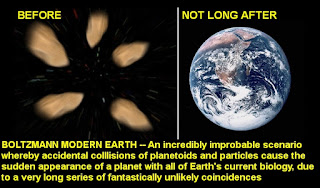Cosmologists
sometimes discuss a possibility called a Boltzmann brain. A Boltzmann
brain is the hypothetical possibility of a brain forming somewhere in
space from an incredibly unlikely random combination of particles.
Some have tried to explain the very unlikely existence of our
universe by using reasoning along these lines: don't be surprised
to be an observer in a universe like ours, because observers can only
exist in universes like ours. But the possibility of a Boltzmann
brain is sometimes presented to rebut such reasoning.
Let's
consider two possibilities. In the first case, you live in a universe
that is 99.9999% disorderly and chaotic, but there is just a tiny little
area of space that is highly orderly, just orderly enough for your brain
to exist. In the second case, you live in a universe that is orderly
for vast regions stretching billions of light-years, with enough
order to allow the possibility of trillions of life-bearing planets.
Our reality is the second of these cases. But some cosmologists have
argued that from a thermodynamic standpoint and an entropy standpoint,
a "blind chance" standpoint, it is inconceivably more probable that you should find yourself as an
observer under the first of these two cases.
Another
possibility to consider (rather similar to a Boltzmann brain) is
what we may call a “Boltzmann modern Earth.” This is the
incredibly unlikely possibility that a planet the size of Earth, with all of the
complexity and biology of our planet, could arise fairly
suddenly from a random combination of particles.
This possibility of a "Boltzmann modern Earth" is
discussed by ace cosmologist Roger Penrose in his recent scientific
book Fashion Faith and Fantasy in the New Physics of the Universe.
On page 316 of his book, he says, “One can make a very rough
estimate of the probability that life, as it now exists on Earth,
with all its detailed molecular and atomic locations and motions,
came about simply by chance encounters from particles coming in from
space in, let us say, six days!” Penrose then estimates that such
a thing would have a probability of about 1 in 10 to the ten to the
sixtieth power. That is a probability not anything like the
microscopic probability of 1 in 1060
but instead an almost infinitely smaller probability. It's the
probability you would have if you started out with one tenth and then
kept multiplying by one tenth a total number of times equal to a
trillion trillion trillion trillion trillion times.
But
then Penrose tells us that this fantastically unlikely event (a
life-filled Earth like ours suddenly forming from random collisions
of particles) would be far more probable than the existence of
a universe as orderly as ours, saying it “would be a far 'cheaper'
way of producing intelligent beings than the way in which it was
actually done!” He's indicating that the incredibly improbable sudden
formation of a “Boltzmann modern Earth” would actually be much
more likely than the chance of you getting a universe such as ours
accidentally.
Speaking
of the Second Law of Thermodynamics, Penrose states this on page 317:
The
lower-entropy earlier states of the universe that initially gave rise
to humanity in its earliest stages (being of lower entropy simply by
virtue of the 2nd law) must have been far more improbable
(in this sense) than is the situation now. This is just the 2nd
law in action. So it must be “cheaper” (in terms of
improbabilities) for the state to have come about as it is now purely
by chance, than for it to have arisen from an earlier much lower
entropy state – if that
had come about purely by chance!
And on page 313 Penrose states that “the improbability
of the universe conditions that we actually seem to find ourselves
in” is roughly 1 in 10 to the 10 to the 124th power,
which is a probability almost infinitely smaller than the 1 in 10 to
the 10 to the 60th power estimate he made for the chance
of a planet with all of Earth's biology appearing suddenly from
random particle collisions (a “Boltzmann modern Earth”
occurring). This 1 in 10 to the 10 to the 124th power
probability is the probability you would have if you started out with
one tenth and then kept multiplying by one tenth a total number of
times equal to ten thousand trillion trillion trillion trillion
trillion trillion trillion trillion trillion trillion times.
Why such a low probability? The Second Law of
Thermodynamics dictates that entropy must steadily increase. But
right now the entropy of the universe is fairly low. Situations such
as solar systems surrounded by vast amounts of empty space are very
low entropy situations (as opposed to a universe that is a uniform
sea of particles, which is high in entropy). It seems that if the
universe has the low entropy it now has after 14 billion years of
existence, the entropy of the universe must have been staggeringly
low at the time of the Big Bang. And from a thermodynamic
standpoint, such a thing seems insanely unlikely.
Penrose is one of the most well-known cosmologists
around. If his statements on this topic are correct, then we have
perhaps a tremendous irony. Centuries ago, people argued that our
planet and its life could only have appeared if there were some
higher power in the universe, on the grounds that it was too
improbable that so much order could arise by chance. Now after all
our advanced science, much of it done by people wishing to overturn
such a conclusion, we may have discovered that the chance of this
type of order existing randomly by chance (considering the history of
the universe, the Big Bang, entropy and the Second Law of
Thermodynamics) is not greater than was imagined long ago, but
actually very much smaller.


No comments:
Post a Comment